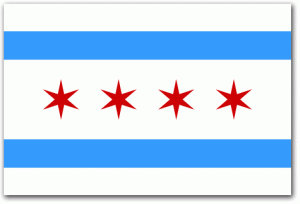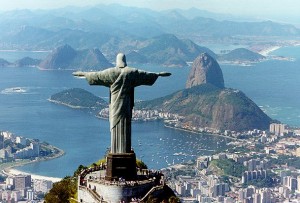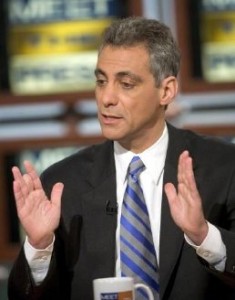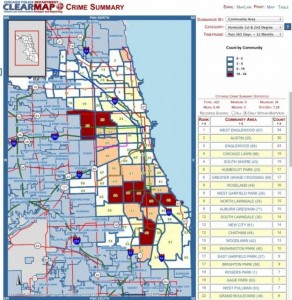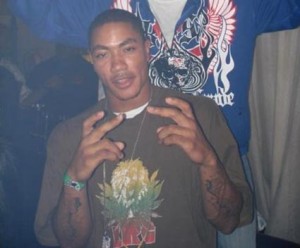Thing about television is that it only shows you the unpleasant and the uncomfortable when it makes for better theater. Rarely is such the case in viewing sports. Besides the actual game action, a national broadcast is going to feed you shots of local peculiarities and regional foodstuffs during timeouts.
Going in and out of commercials you get the blimp views of the stadia amid a lit up downtown at night, stock footage of hustle and bustle during the daytime, and shots of some unique piece of architecture soundtracked by a song from and/or about whatever city the game is in. Oh, hey, look at the city-native-but-now-probably-expatriate celebrity in the stands totally trying to go unnoticed in that black baseball cap. (8,974 screenshots get tweeted.)
And Drake. There’s always Drake.
Sports TV doesn’t show you the homeless vet shaking a can outside the arena, though. That fire truck on its first of five runs that night. Nah.
A child bleeding out next to her bike a few feet from a lingering wisp of smoke. Hell no.
Ditto the crumbling overpasses, the sick without access to treatment, the ignored poor and starving, the epidemic of lack of decent public education, and the protests that not only dare to suggest these things are more important than sports—I know, I’m taken aback as well—but that sports are even exacerbating the situation. None of that would reach you as you took in a World Cup match broadcast.
Just as it would fly under the radar on any Sunday broadcast from Soldier Field or Wrigley Field hosting the national game of the week (merited by ratings draw, not on-field performance in the case of the Cubs).
There are connections between what one might initially think of as two very unrelated places save a love of sports, Brazil and Chicago. One place is supposedly all samba and bare skin. The other is just blues and obese “sah-sidge deep dish” connoisseurs. Hardly. They are layered places of tumultuous sociopolitical condition where many are finding sports have gone from enjoyable distraction to tool of oppression.
Only a few months after we all kind of pointed and laughed at the fiasco of Sochi, South Carolina hosting the Winter Olympics, hosting the World Cup has been seen as a slap in the face to many Brazilians. Silly them, they dare to ask why the country waste money on soccer stadiums instead of addressing severe needs of its people.
News of the violence in this city wears on me.
Sometimes to the point of flat out jading.
It wears more so, obviously, on residents of Chicago’s affected communities (full disclosure—I live in a predominantly middle class White neighborhood in the Southwest Side insulated from the city’s violence), leaving them anywhere between livid to resigned to doing whatever possible to survive. It has compelled the same political faces to be trotted out so many times that I can’t bear to listen to them blow hot air in a slightly different flavor about new strategies for our otherwise fine police officers who despite their intelligence and diligence will always be a step behind the criminal element for reasons beyond the cops control.
Hell, CNN produced a highly-scripted “documentary” series on this place that boiled down to an African American principal carrying a high school on her back, white people celebrating the Blackhawks and concerts in Grant Park, and flawed-but-noble Rahm pushing this city through the 21st century, haters be damned.
Most actual Chicagoans rolled their eyes watching their city get taken through the reality TV laundry process, though, and the rest of the country got to reinforce from a safe distance some stereotypes about this actually cosmopolitan more ways than not place. That’s Chicago, though.
We’re this behemoth of music, comedy, physical art, food, corruption, sports, and some crime that sticks out like an uber multicultural architecturally top-notch, white collar pretending to be blue collar loud thumb of the pretentious fist (up its own rectum usually) of Illinois from the suicidally bland Midwest.
We are America’s middle child, despising and constantly trying to discredit (while simultaneously coveting) the successful older sibling, New York, that gets bragged about to all the other countries, while also scowling at the annoying jet-setting, cool little brother, Los Angeles.
And America only pays attention to us with a pleasant pat on the head for trying really hard and bringing home an A paper for the fridge or after five consecutive minutes of yelling “Mom! Dad! Look what I’m gonna do! Look! Mom! Dad! Watch! Look!” and we jump and split our collective forehead open.
“Aw, you landed the George Lucas Museum, Chicago?”
America coos without letting its eyes tear away from the sort of news program it’s watching and feeling smart about. “Nice job.”
“OHMIGOSH, Chicago! What happened?! More than 80 people shot over the weekend?! Didn’t I tell you over and over not to climb on top of that ghetto?! Get in the car. We’re heading to the emergency room… I mean, writing an explanatory piece on why you’re awful or a column that offers an asinine solution to dismantling the Black and Hispanic communities so this never ever happens again.”
So many thinky, feely pieces get churned out. The Chicago Sun-Times Rick Telander wrote something about how the eighty-plus people shot in Chicago during the 4th of July weekend somehow impacts NBA basketball or vice versa or something. After a dozen readings I still don’t know what Telander was trying to accomplish other than “Look me, the sports writer person. I can have social thoughts, too.”
Rather than hamfist his way to a non-conclusion that unfairly lumped LeBron James, Carmelo Anthony, and Derrick Rose into a conversation on gun violence, if he was looking to go the sports-with-a-conscience route Telander might have been better off revisiting a good piece he wrote a year ago on the inanity of Chicago mayor Rahm Emanuel’s push for a new DePaul University basketball arena in the face of massive public school closings and other fiscal issues.
That’s a sports related thing that also has ties to the infamous Chicago crime that has become so en vogue to finger wag about. I’m not even asking he use his column to explain the layers of history and politics that have created the “how many Chicagoans got shot today?” apathetic mentality from so many, even though it’s unfair in any discussion of violence in Chicago’s poor communities to neglect that history.
But a feeling of wasted public money for an awful private college hoops program isn’t sexy news.
Can we tie in a murdered contractor or something?
Spice it up a bit?
No?
Then you only hear about Chiraq.
Not-from-Chicago Nicki Minaj titles a song with the portmanteau, The Daily Beast and other fishmongers make it their pet word, more than 80 people get shot over a holiday weekend and the city I live in gets labeled a war zone, efforts are made to give the distance between where a person got shot and the house of the Black President who is only at that house a few times a year—but you don’t see it.
Coming in and out of a commercial during a Bulls game, the TV isn’t going to give you a shot of a closed grade school in the Englewood neighborhood. Probably no mention of newly-drafted son of Chicago Jabari Parker rightly coming out and saying he in no way supports the “Chiraq” counterproductive branding.
Hidden are the protests in the streets of Roseland or a few blocks away from the United Center demanding this violence be recognized as a product of systemic marginalization. Buckingham Fountain. Some restaurant worker (likely a person of color) cutting up deep dish pizza for tourists. The South and West Sides are folkloric. They’re Keiser Soze.
TV doesn’t much show that to a national audience.
Because when sexy violence doesn’t come out of the South and West Sides (and it has to be sexy—dozens of victims in one night or a public school Honors student that had dreams of being a doctor, but not “unidentified male” or “known gang member”) it’s as if they aren’t even “Chicago.”
Two robberies in mostly White Lincoln Park, though, and a solution must be found, darn it.
In general, most of the stories [in the local media] aren’t focused on the victims,” [Michael Lansu of the Sun-Times Homicide Watch blog] said. “That’s not always the case, but the statistics kind of take the lead.
“I think the national media only pays attention to Chicago when its [sic] an issue of sheer numbers.” But even then, the terminology is still different. “In Chicago, there were [seven] people shot outside of a laundromat, and no one uses the term ‘mass shooting,'” he said, referring to an incident there in June. (There is no official FBI definition for a “mass shooting,” Mother Jones says, although there is one for “mass murder.”)
The poverty and crime that is born of the marginalized communities is ignored if not victim-blamed. Our mayor exemplified that following the bloody 4th weekend when he harrumphed about a lack of community involvement.
“The number of shootings and murders that took place over the holiday weekend is simply unacceptable, and points out that we still have work to do,” he said in a released statement Monday, July 7.
“The solution does not just include policing – although we’ll continue to look for ways to put more police where they’re needed. We also have to give our young people alternatives to the street, and as a community we need to demand more of ourselves and our neighbors. This violence is unacceptable wherever it occurs in our city and all of us need to take a stand. The only way we will meet this challenge to our future is to join with one another and create a partnership for peace.”
Getting the public to put blame on the already disenfranchised isn’t anything new for our trusty mayor.
I haven’t heard Rahm speak to Ta-Nehisi Coates’ housing discrimination research as root of Chicago’s problems or that as is typical of struggling neighborhoods it comes down to an unwillingness to spend money and create jobs and necessary services there.
(And in this town he’s “Rahm,” not “Emanuel.” Like she’s just Oprah or he’s just LeBron. Even his predecessor, Richard M. Daley, too sick to testify in the latest corruption case he’s involved with, wasn’t dubbed worthy of one-named celebrity.) Rahm is sort of like Chicago’s Sepp Blatter, only Rahm exercises a lot more. Speaking of…
As the 2014 World Cup has just concluded, we saw only one of two Brazils on TV. It was ESPN’s sets with a South American flare (which sometimes was just a random bowl of huge limes on a table). It was the animation with the boy in awe of the soccer Super Bowl in his backyard. If he was a real boy, he wouldn’t have a backyard, and he’d probably be malnourished. There were not mentions of a year’s worth of civilian protests over Brazil’s government deeming pumping billions into hosting a month-long sports tournament more important than violence, poverty, and poor education for kids.
“I’m Brazilian, I watched the World Cup, I’m not against the World Cup,” Oswaldo Barros, 42, a teacher from Jacarepaguá in the west of Rio de Janeiro, told Al Jazeera America. “I’m against the manipulation of public money.”
His is a typical opinion of the less-than-wealthy in Brazil. But TV did a good job of not letting the audience see or hear from an Oswaldo Barros or the many like him.
Even in Portuguese that sounds pretty familiar around these parts. The public dissent over the World Cup and Rio hosting the Olympics in 2016 while neglecting what it has deemed to be its own second-class citizens shares a sad coincidence with Chicago. In 2009 the International Olympic Committee deemed Chicago unworthy to host the games. Rio was chosen instead. Some Chicagoans like me were relieved because we think Olympic-sized money should be spent on more serious problems we see every day, be it the politically bastardized school system, more cops on the streets, or merely our annual spring pothole problem when the snow melts. Daley thought otherwise because like the national news, Daley didn’t care about much besides himself.
His successor picked up where he left off. Rahm hasn’t yet pushed for the Olympics here, but his recent track record shows he probably will at some point. The DePaul arena shows that he sees sports as a money-maker… for him. And he has to spend money to make money. The spending is public—whether literally public money or just the cost of continuing to ignore the problems on the South and West Sides that don’t really exist in what the haves consider the true Chicago. The profit is mostly private.
But people who watch local news and who read the popular national blogs don’t want to be bothered by reality seeping into their sports fantasy. Brazilian and FIFA soccer honchos know that. Olympic committee suits know that. Rahm knows that. Sports are a wonderful respite. Unfortunately too many of us treat them as soma, and people in power get to exploit that.
Which is why as bullets bang through Chicago, its mayor bangs the drum for renovations to Wrigley Field and trying to host a Super Bowl and/or NFL Draft here. And many Chicagoans’ eyes grow wide and they call sports radio and drool about why football is made for the Soldier Field wind and snow in February and Wrigley Field needs to be less of a dump. Many Chicagoans also wonder why their kid has been shifted to a school a few miles away from the closed one down the block and how gang territory has to be crossed to get an education and maybe the only meal of the day. Some ask about slush fund misappropriations. But that stuff isn’t sexy and fun, so it doesn’t count.
Want news-worthy? Want trending? Call on the National Guard to come into the forced ghettos while being largely ignorant of and lazy to the situation. Because if anything can solve shooting lots of people it’s having people in uniform threaten to shoot lots of people. How’d that work in Brazil?
“When I was in Brazil for those first days of the World Cup,” writes Dave Zirin, “I was—with many other journalists—tear gassed by military police. I saw sleek, urban-outfitted tanks in the streets and I felt concussion grenades send subsonic shrapnel crashing into my eardrums. I didn’t see the drones flying overhead, but then again, no one without a Hubble telescope is supposed to see the drones.
“I also saw militarism that was less high-tech, and more of the traditional boots-on-the-ground variety. Several of the favelas—precarious communities of the poor that were once sanctuaries for both outlaws and revolutionaries—are under full-scale occupation. This has sparked protests by favela residents against the violence of living under constant police subjugation.”
Not surprisingly, Brazilian officials don’t care about stripping people of the sort of pride that comes with not having armed guards in front of your house at all times. So let’s bring that to Chicago since we seem to just be North Rio. You can guarantee if a Super Bowl or Olympics lands in the Windy City Rahm and top cop Garry McCarthy (if either still has a job here) will quietly make sure shiny happy sports fans aren’t aware that Chicago includes segregation of its poor and people of color, and that they are not very happy. Even if it takes a few more uniformed non-CPD people with guns to quarantine the scary people with guns.
I had a lot of fun watching the World Cup. Watching Chicago’s sports teams is necessary for my soul and sanity, even if the Cubs often crush the former and strain the latter. But it seems that similar to Brazil sports in Chicago are being used as a tool if not a weapon by some people in power to amass more power, and money is power. And we let some seedy people off the hook for using sports as a smokescreen because, well, we like sports a whole lot. It sucks to think sports might be creating more problems that those sports are supposed to temporarily take our minds away from in the first place. Luckily we’ll have few opportunities to consider all that because it doesn’t make for a good story.
Tim Baffoe is a lifelong resident of Chicago’s Southwest Side and is a teacher, pizza delivery driver, and freelance writer with a regular sports column for CBS Chicago. You can follow his desperate cries for help on Twitter at @TimBaffoe.

